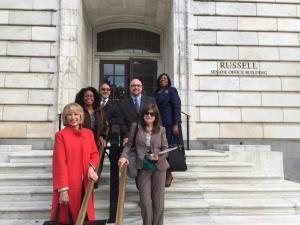Washington, DC – Today the Eldercare Workforce Alliance (EWA) held a Congressional breakfast briefing on the importance of funding geriatrics and gerontology training programs for health professionals, including direct-care workers, and providing team care that places the individual and family caregivers at the center of care. The briefing was supported by the Senate Special Committee on Aging. “It Takes A Team! What we will need to meet needs of older adults and their family caregivers” highlighted the need for geriatrics and gerontology education and showcased the opportunities for Congress to ensure the entire health care team is competent to care for older adults. Michèle Saunders, DMD, MS, MPH, past-president of the Gerontological Society of America and co-convener of EWA, moderated the briefing and reminded the audience, that “By 2030, America’s 65 and over population will mushroom from 12 percent to 20 percent of the total population. Meaning nearly one in five Americans will be over the age of 65.”

Dr. Lenise A. Cummings-Vaughn, an assistant Professor at Washington University in St. Louis, said, “The overall decline in geriatric fellows is troubling but the number pursuing further training, often important in furthering the foundations and research needed in academic geriatrics, is even lower.” Dr. Cummings-Vaughn, a recipient of the Geriatric Academic Career Award went on to say “These are some of the reasons that funding for further career development is needed.” Dr. Tara Cortes, Executive Director of the Hartford Institute for Geriatric Nursing in New York echoed Dr. Cummings-Vaughn’s concerns about the lack of geriatrics professionals but said “We must ensure that we not only have specialized practitioners to care for older adults, but also that there is competency across the entire workforce.”
Properly trained providers understand the unique needs of older adults, especially those with multiple conditions, and their family caregivers. “Too often health care providers are not specially trained to care for older adults and are likely to miss warning signs and dismiss symptoms as simply “part of getting old” when in reality many issues manifest differently in older adults than in younger individuals,” said Dr. Andrew Heck, a licensed clinical psychologist and Clinical Director at Piedmont Geriatric Hospital in Richmond, Virginia.
Stressing the importance of social services and supports, Dr. Carmen Morano, an Associate Professor at Silberman School of Social Work at Hunter College in New York, said “failure to address simple daily tasks, such as meal preparation, shopping, managing finances, and home maintenance will predictability result in a failure to maintain the physical and emotional health of older adults.” Arnetta Whittaker, a home health aide, in Washington, DC shared her experience as a direct-care worker providing daily supports and adding “As older adults need additional help to remain in their homes in comfort, safely and with dignity, there will be a greater need for direct-care workers like my colleagues and me.”
Karen Marshall, Family Caregiver and Executive Director of the Kadamba Tree Foundation, shared her personal experiences with family caregiving, saying “Agencies want to help and be supportive but don’t necessarily have the tools to communicate with each other and families effectively. Anything we can do to make the system more cohesive and interdisciplinary while empowering the family caregiver and individual will be important for the future of eldercare.”
The Eldercare Workforce Alliance is comprisedof 30 national organizations united in their commitment to address the eldercare workforce shortage in order to ensure that older adults receive quality care in the settings of their choice.The positions of the Eldercare Workforce Alliance reflect a consensus of 75 percent or more of its members. These statements reflect the consensus of the Alliance and do not necessarily represent the position of individual Alliance member organizations.The Eldercare Workforce Alliance is a project of The Advocacy Fund

